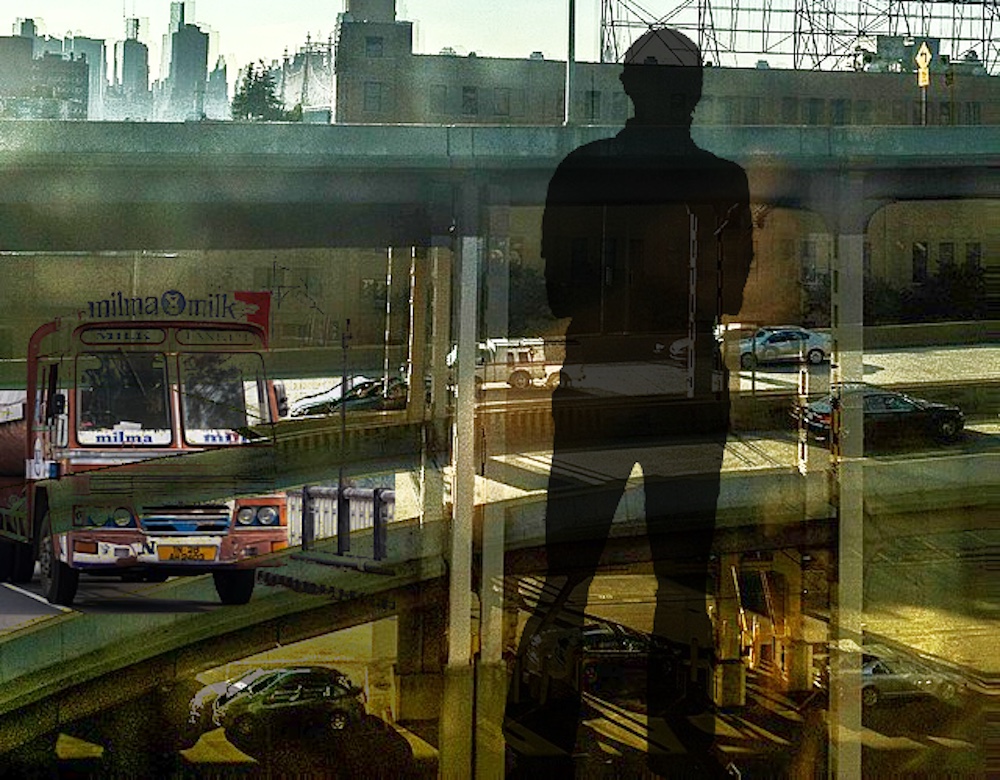Dreams Are Where My Father Lives

art by Amanda Yskamp
The other night, I dreamt that my father became a standup comedian. There had been a lottery where folks whose numbers were chosen could have their shot to try out. When the more established comedian no-showed, it was my father’s number that flashed on the screen. He took the mic and (at least in the dream) the rest was history.
I’ve dreamt of driving with him through some unknown town, buildings rushing by, mostly short rows of storefronts like the main drags we used to travel down when running errands in Queens. We’ve had conversations in some of these dreams, though I can’t recall what they were about exactly. A month or so before I found out I was pregnant with my daughter, I remember dreaming about him waiting by the curb on a familiar side street back in my hometown. He looked ecstatic in a way I had never seen him. An unfamiliar car pulled up, and he got in. As it started to pull away, I could see his face through the back window. He was still beaming.
I have woken up after each of these dreams and for a moment, I think he is still there. It’s as real a feeling as the feeling of my head on the pillow, the stray strands of hair on my face, and the warmth of the comforter shielding me against the coolness of the early morning. It’s only a second or two later that I realize he isn’t there and hasn’t been there for a number of years now. The reality of being awake becomes a weight, keeping my wishes from flying too high. Instead, they wait for the freedom of sleep to take flight once the sun disappears behind the horizon. Then, they can go about weaving a reality of their own making. It’s a reality where his hair is still mostly black, even if for much of his life, it was a gift courtesy of hair dye rather than genetics. He is still smiling and we are still talking freely, as father and daughter, as co-conspirators, and people-watchers.
“It’s so interesting that your father has been in your dreams as much as he has,” my husband often tells me after I finish narrating yet another dream where my father appeared, “Baba has almost never appeared in mine.” My husband and I are fundamentally the same person, sharing overlapping interests in metal, movies, and at times wry, bizarre humor. I never got to meet his father, his Baba, because he had passed away years before we met. Three years after we met, I would lose my father at around the same age my husband was when he lost his.
My father and I were close, as close as an often stoic, immigrant, South Asian father can be. The common trope for immigrant parents with second-generation children is the desire to continue cultural expectations, especially when it comes to academic achievement and choice of life partner. While it was my mother that drove home that I needed to marry someone with roots in our ancestral state of Kerala, my father never was that direct. “Let’s keep an order,” he would joke, “first, consider guys from Kerala. Then, Tamil Nadu. After that, the rest of South India.” The unspoken expectation was that anything outside of that would be fundamentally verboten, never mind other factors like academic standing, all of which should also align.
I was a medical student when I met my now husband. We aligned in terms of things that don’t typically appear in matrimonial ads or websites, like our mutual love of classic rock and metal, and a tendency of our thoughts to veer towards the sheerly ridiculous. My husband works in tech, though the path he took to get there was not traditional. His personality, like his family and very unlike mine or my family, is outsized and boisterous. He and his family are from Maharashtra, specifically Pune, a city just a few hours east of Mumbai. I had been to Mumbai several times, as my mother had been raised for much of her life there. Pune, in contrast, has been sculpted mostly from stories he and his family would tell me, about street food vendors, navigating often chaotic streets, and finding moments of peace in small, intimate restaurants and cafes. The rest came from old photos on a calendar that hung in my mother-in-law’s home depicting parts of the city. Each page was bustling social centers like shop-lined roads and theaters.
My husband was not the vision that came after the academic achievements were done, college degree conferred, and perhaps white coat ceremony completed. Grief at its core is loss. What is disappointment but the loss of a dream because of a perceived failure? It is its own kind of grief. When disappointment descended, my father wore it on his face, where it inhabited both his frown lines and crow’s feet, deepening them like riverbeds. Gone were our usual exchange of mostly ridiculous observations and non sequiturs which we would send each other by email or text. He withdrew virtually, his typed words sparing. He also withdrew in-person, choosing to stay behind at home with my immediate family as wedding festivities got underway. There were dreams I’m sure he had, ones that seemed to slip through his fingers just as the wedding garland left my husband’s hand and found its way around my neck, and mine around his. Perhaps there was grief.
Our last meeting was in a cafe a few blocks from Penn Station in January of 2020. My husband and I had come to New Jersey from Cleveland. It was during one of my vacation blocks and I had just come off a long stretch of grueling rotations during my second year of neurology residency. I had reached out to my father before the trip, hoping to meet. After some back and forth, he acquiesced, and we arranged to meet at that cafe. My husband and I had gotten there first. We were both uncomfortable, shifting this way and that, holding each other’s hands across the small table. My father walked in about fifteen minutes later. He was joining us after having taken the 2 train up from his work downtown. Knowing him, I knew that this encounter would be tied to the Long Island Railroad train schedule, keeping a close eye on when the next train home might be. He looked smaller than I remembered, though he had always been on the smaller side, hovering around 5’6”. His hair had gone entirely white, and his face appeared sad and worn. He was stiff when he sat down, like a plank being leaned against the bench next to where I sat. My husband sat in the chair across from us, alone on his side of the table. The conversation that followed was halted and stilting. We may have ordered coffee, maybe tea, it’s hard to recall when so much of the encounter was spent trying to read the lines in my father’s face while defending the life I had created with my husband. Soon it came time to leave. We arose together, gathering in an awkward clump in the aisle. I hugged my father and he hugged me. “Take care of yourself, kanna,” he said, using a Malayalam term of endearment he had used for me my whole life. He was quick in his departure, the door closing behind him as he walked out into the winter evening. It would be the last time I would see him alive.
When I was younger, I would talk about my dreams with my father and my brother. We all had a knack for coming up with the most over-the-top, bizarre dreams. Narrating them to each other would send us into fits of laughter, and we each would try to best the others with more absurdity and more inanity. Everyone else seemed to have dreams that followed a logical narrative, even if unpleasant. I considered myself lucky to never have had nightmares, not ones I could remember anyways. The only one I do remember was from when I was around seven or eight. I remember being on the side of a hill, and then becoming suddenly overwhelmed by the realization that my father had died. I remember waking up sobbing that morning. I never told him about that dream.
“I hardly ever remember my dreams,” my husband often tells me. Rare are the days he comes to me with a dream that he was able to hold on to after waking up. After my father left this world, he has continued to inhabit the world I constructed over the years, the one to which I return every night. When I wake up in the morning after having spent part of my night with my father again, I wonder if it is better to have him visit so often or to never have him visit at all. Should the nights be set in our fragile edifices, our memories of places stitched hastily together, and inhabited by the faces of those we know, and knew? If faced with the faces of those we have lost night after night, can grief ever reach a steady state? Or is it by meeting them again and again that their features are etched deeper into our minds each time, even if it has been months or years since our eyes have last beheld their faces?
It is a small joy though to know that in at least one of these dreams, even though my father is as solid now as the wind, he was in that moment telling jokes and making others laugh.
Myself included.


